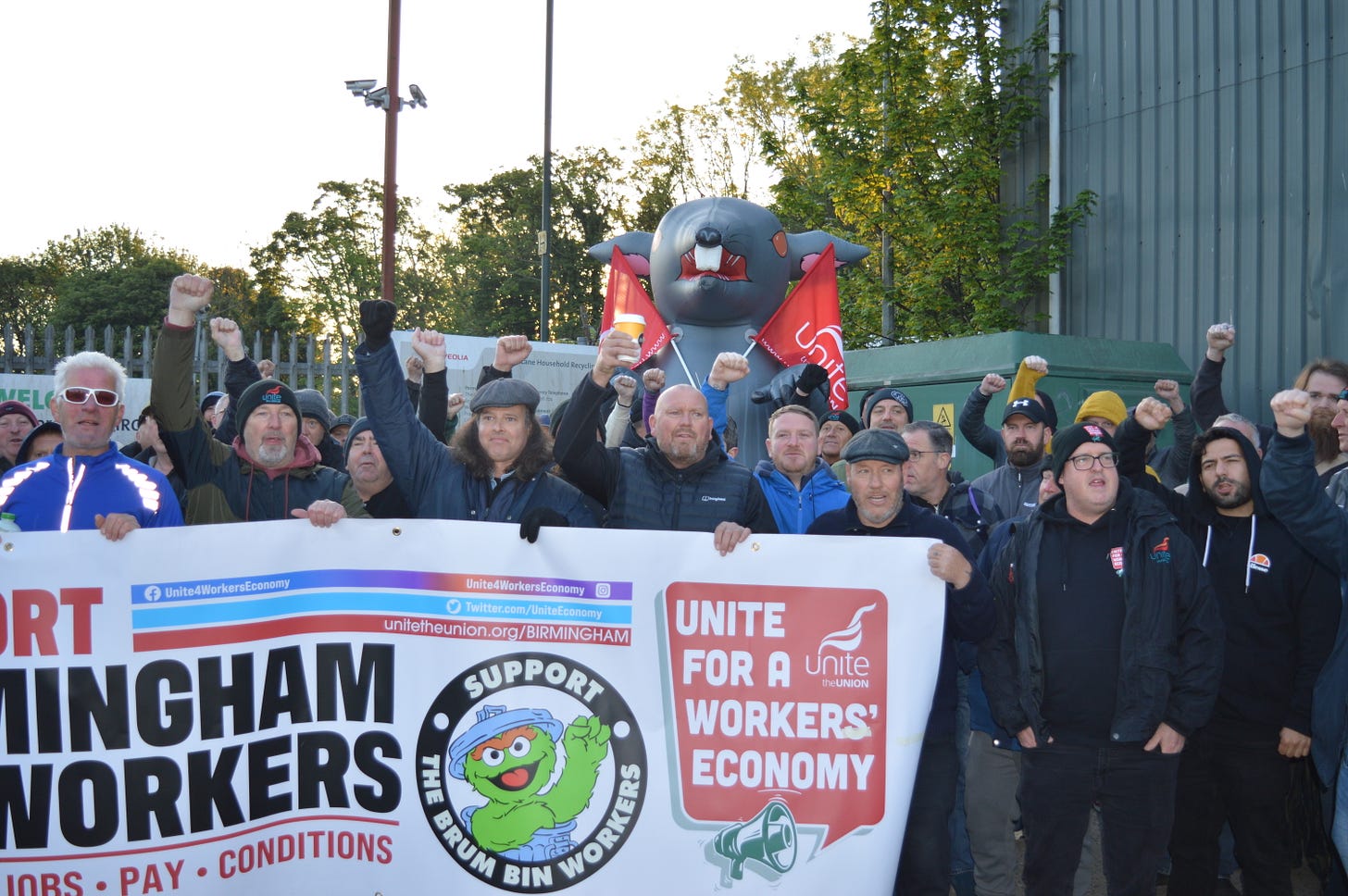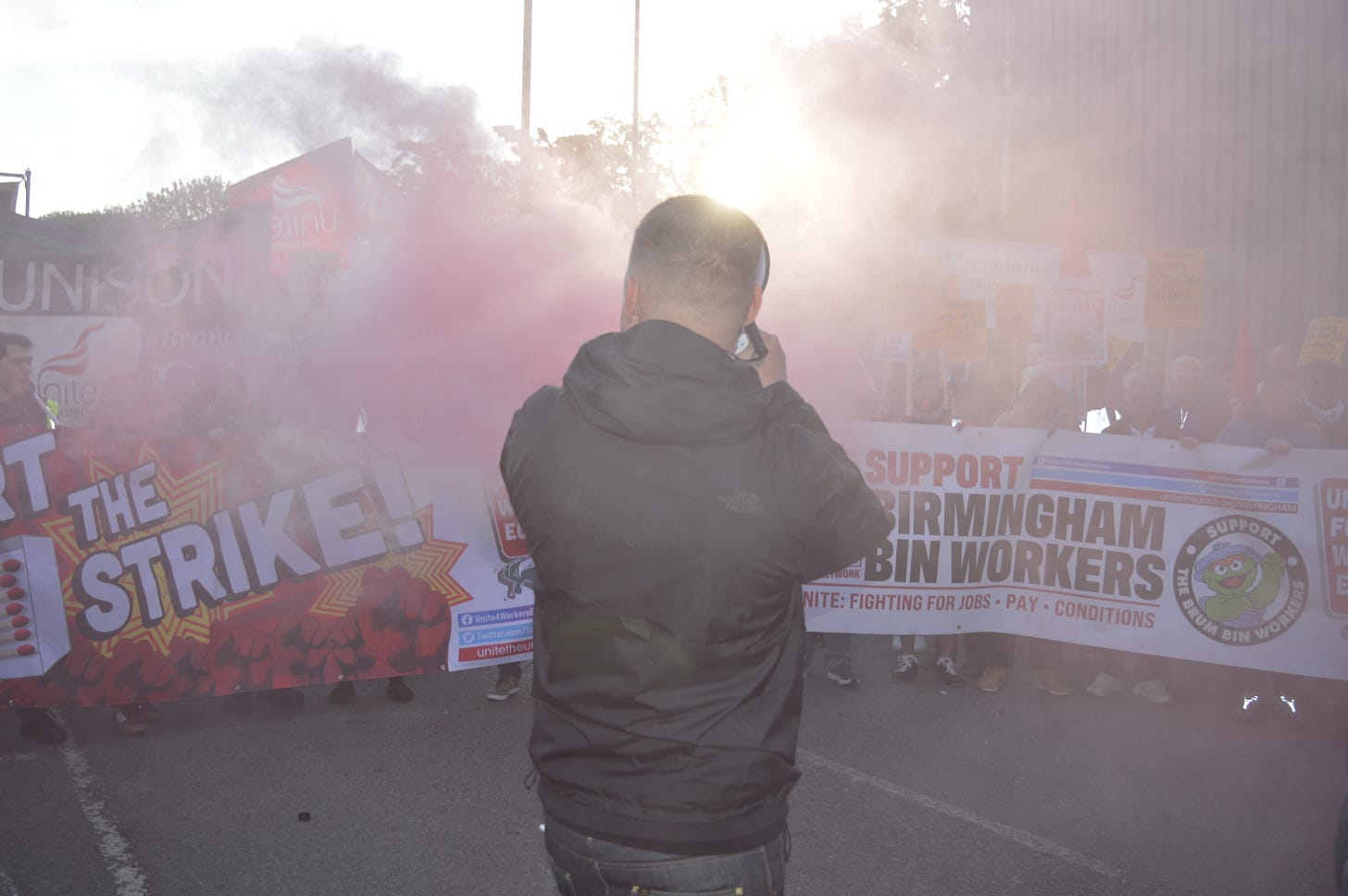By Paula Dunne, Strike Map steering group member
Climbing into the minibus at quarter to five in the morning, nine of us travelled to Birmingham as part of the Oxfordshire delegation for the bin strike Megapicket. On the way, I received a phone call from Henry – the co-founder of Strike Map and one of the main organisers of the event along with We Demand Change, and Peace & Justice Project – who confirmed that they had successfully prevented scab trucks from cleaning up the rubbish in the city, forcing Birmingham City Council to acknowledge and respond to the action. Shutting down the Lifford Lane Depot was a huge win, and that was before many delegations across the country had even arrived at the picket. Once we were in Kings Norton, Birmingham, we got off the minibus to a huge crowd gathered in the distance.
Just a few weeks before, by contrast, when Henry and I travelled to the picket to hand over a cheque for two-thousand pounds to the striking bin workers on behalf of Strike Map and Football Lads and Lasses Against Fascism, there was an unusually large police presence threatening section fourteen on the striking bin workers, who were slow walking in front of the scab trucks. There were around eighty striking bin workers at this depot and, speaking to them, they were so grateful and appreciated the financial support from different organisations and union branches in the country. What they needed more than anything during this stage of the dispute, however, were public displays of solidarity.
Now, once the Oxfordshire delegation had set up our Trades Council banner, the nine of us marched to greet the huge crowd of trade unionists from bin workers to fire fighters, to NHS workers, to other striking workers from across the country, to trades councils, to trade union general secretaries, to the people of Birmingham. Everyone was gathered with one common purpose: to show solidarity to the bin strikers expressing their anger at the local and national Government’s continuation of austerity.
As we approached the crowd, we heard chants of “when I say union, you say power” together with flares being set off. We already knew there’d be union branches and trades councils from Leeds, Sheffield, Liverpool, Bristol, Gloucester, Oxfordshire, and of course, Birmingham, but coming close we saw banners from Somerset, Manchester, and York too. In total, the Megapicket was supported by over twenty national trade unions, local unions, and campaign groups.
As a Brummie myself, and a member of the Strike Map steering group, I welcomed a dozen of speakers to the Megapicket, including a Birmingham bin worker, the general secretaries of ASLEF, FBU, and NEU, a striking worker from Manchester NHS workers, and Sheffield Veolia refuse workers, We Demand Change, a Unite official, and Birmingham activists and trade unionists.
The speeches opened with Derek Roberts, one of the striking bin workers who highlighted that this dispute is unusual in many ways as it's about retaining their existing pay rather than asking for any kind of pay increase, with Birmingham City Council attempting to cut bin workers' salaries by upto eight thousand pounds. This would mean that workers would lose around £650 of their wages each month. Earlier this year, the same city council decided to award councillors a 5.7% pay rise.
These bin workers are not just facing cuts by a council, but by Government backed commissioners supported by an austerity driven Government. The dispute is unique in that it is a labour-led Council with a new Labour government, and Mick Whelan the general secretary of ASLEF said “It’s to our shame that we have to stand here today in a labour controlled authority talking about people's wages being changed under this government without agreement, talking about the fourteen years of austerity, rather than putting the blame on where it should be and correcting the investment for workers.”
That these attacks are happening by a labour led government, both local and national, serves as an important reminder to all workers that we cannot rely on governments to protect us, that we need to organise together side by side to push against these attacks on our livelihoods. While the Labour government have brought in the army and scab agencies to attempt to undermine the strike, Steve Wright, the general secretary of FBU made it absolutely clear that “You have more chance of asking firefighters to go and put petrol on fires than for us to break picket lines, break your strike and undermine your dispute."
This dispute is looked on with significance, not just from all over Britian but globally too. There were speeches from workers taking strike action in other disputes in Britain, and Nina Barbosa an NHS worker and part of the NHS Workers Say No campaign sending solidarity to the striking bin workers.
Throughout the speeches, the overall messages were clear: first, that collective action works as – just by being there, – we shut the site down. Second, that the Birmingham bin workers’ fight is all our fight and this action is just the beginning. The local organising that took place in Birmingham, and the powerful speeches by bin workers at the Megapicket and to the press, have been vital.
These continued austerity cuts will not stop at the bin workers, and other councils and employers will be emboldened to do similar if this strike loses. This Megapicket is something our movement needs to seriously consider replicating across this country to fight back. It is an important reminder to everyone in the trade union and labour movement that we need to be out on the streets showing solidarity with striking workers beyond social media, online actions, and meetings. And it showed the local council, the government, and the media that this type of mass mobilisation can bring the organised movement together to win.
As general secretary of NEU, Daniel Kebede, reaffirmed, "We want to see more of this power, because without the people here, not a single cog would turn."
How you can support the Birmingham Bin Strike:





